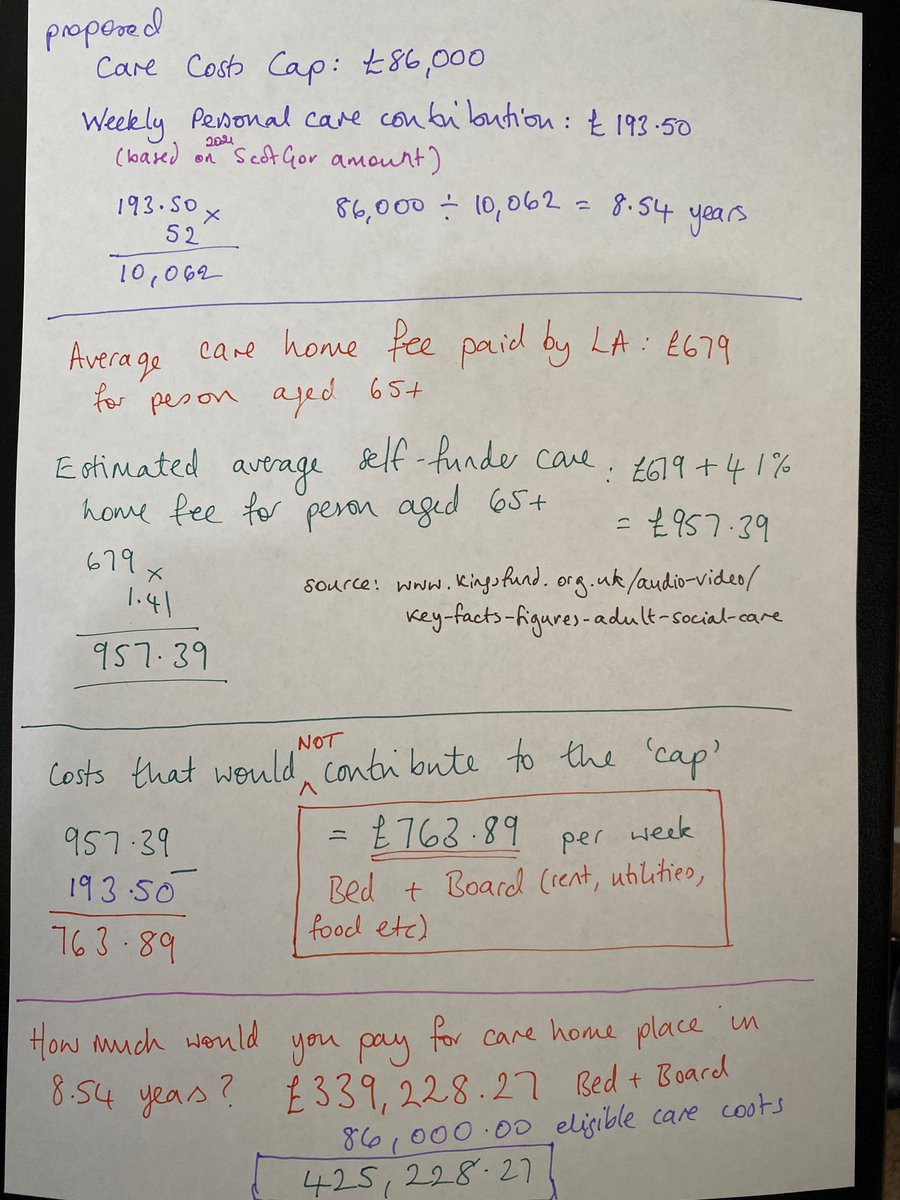
Why the Government's plans (see detail here: gov.uk/government/pub…) will not "fix" #socialcare 🧵 1/19
The key proposal for social care are to introduce a lifetime personal care costs cap of £86,000 - will help only a tiny minority of people who use social care. I explored this in my (2017) book, Duties to Care cambridge.org/core/books/dut… 2/19
As ever, the devil is in the detail. The lifetime care cap was proposed by the Dilnot Commission in 2011. Then, a cap of around £35k (accounting for inflation, that would be around £43k now) was described as the fairest figure. webarchive.nationalarchives.gov.uk/ukgwa/20130221… 3/19
The cap was legislated for in the Care Act 2014 (s. 15) Note that this pegs the costs that count towards the cap on care costs as being at the level the local authority would have paid for the care: legislation.gov.uk/ukpga/2014/23/… (s.15(2)(c) 4/19
Why is this important? Well, self-funders (who will be those the cap would benefit) generally pay *much more* for the same care services as local authorities pay. See: nature.com/articles/palco… for my analysis of these issues from 2017 5/?
TL;DR? : 'Underpayment by local authorities means that “some councils pay £2.24 an hour for residential care” and that “96% of people paying for their own care pay on average 43% more than state funded residents in the same home”' Quotes from: publications.parliament.uk/pa/cm201617/cm… 6/19
If a self-funded social care user pays 43% more, then that means that £86k cap would actually be more like £123k of costs. And that would only be for the "personal care" part of social care fees - and would therefore not include the costs of 'bed and board' in a care home 7/19
In Scotland, where personal care is free, care home residents with assets over the threshold have to pay their bed and board costs: the Scottish Government currently contribute a set rate of up to £193.50 per week for personal care costs gov.scot/news/more-help… 8/19
If the English care cap only covered care expenses at a similar rate, it would take around 8.5 years to reach the care costs cap of £86k, by which time the person contributing towards their costs of care would have actually paid out more like £425,000 9/19 

In the example on p. 17 of the command paper published today 'Yusuf', these numbers look very different - there it looks like the entire care home fee (including 'bed & board' costs) would contribute to the cap. But this cannot be correct. 9/19
Why? The command paper says that this will be implemented using legislation already in place (see paragraph 38). But Section 15(6) of the Care Act 2014 says that 'daily living costs' will be disregarded both in calculating how much has been paid towards care costs, and 10/19
'daily living costs' remain payable after the person reaches the cap (s. 15(7) Care Act 2014. And that's just the problems with the care costs cap AFTER it comes into force - under s. 15(1) costs that fall due before then don't count. 11/19
Also, before moving on to other issues with the announcement, the average length of stay in a single residential care home in England is 26 months. It is therefore highly unlikely that the average person will get anywhere near the cap 12/19
Other problems with this announcement:
1 - the total additional funding announced for social care in the next 3 years is 5.4 billion (para 36). The current funding gap is 2.2 billion local.gov.uk/future-adult-s… This isn't going to be enough extra funding to fix social care 13/19
1 - the total additional funding announced for social care in the next 3 years is 5.4 billion (para 36). The current funding gap is 2.2 billion local.gov.uk/future-adult-s… This isn't going to be enough extra funding to fix social care 13/19
2 - the way to pay for this will be through Employer and Employee National Insurance Contributions. So social care employers and employees will have to pay more tax to fund this. I fail to see how this will help - surely, a chunk of the extra funding will be swallowed up 14/19
3 - note that the command paper also says (para 36) that council tax, social care precept and 'long-term efficiencies' will be expected to meet demographic and unit cost pressures. So: more tax rises, on top of all this. 15/19
4 - there is mention of more integrated care in the command paper. Worryingly, the Telegraph reported a couple of days ago that integrated care pilots are increasing delays: telegraph.co.uk/news/2021/09/0… 16/19
5 - I'm interested in the potential plans to professionalise and develop the social care workforce. This is good news, but we have to wait for a future white paper for the detail. 17/19
I have a chapter about adult social care and how to rebuild after COVID-19 in this marvellous book: bristoluniversitypress.co.uk/pandemic-legal… (feel free to email me [r.j.harding@bham.ac.uk] for an author's pre-print of my chapter, but also consider buying the book!). 18/19
That's it for now, but I may add more later...it's too sunny and warm to be this cross. 19/19
• • •
Missing some Tweet in this thread? You can try to
force a refresh



